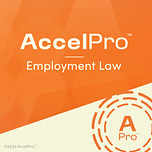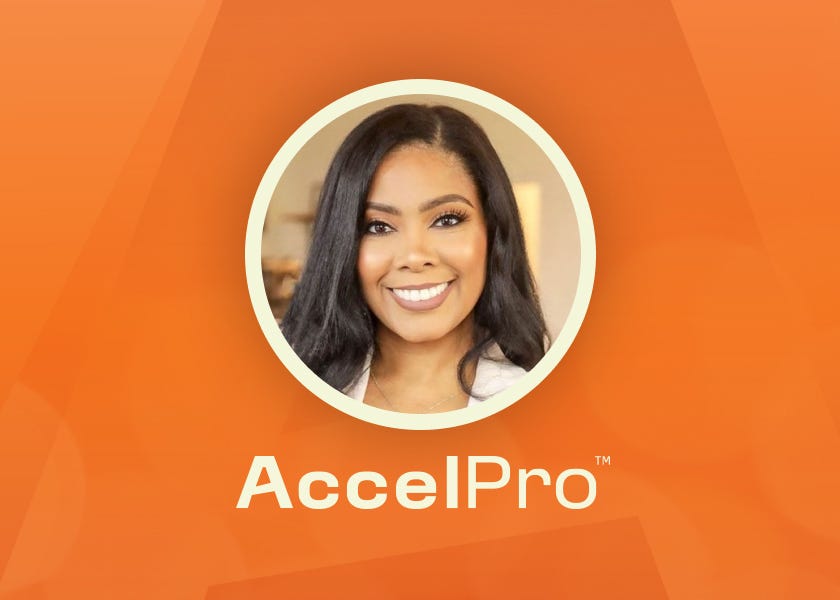Welcome to AccelPro Employment Law, where we provide expert interviews and coaching to accelerate your professional development. Today we’re featuring a conversation about employment law trends in 2024. Our guest is Lakeisha Robichaux, the owner and founder of Chief of Minds, a human resources consulting and outsourcing firm.
We asked Robichaux to pick three trends in employment law, and she named artificial intelligence, DEI and emotional intelligence as issues that will be front and center for HR executives and employment attorneys all year.
Each brings unique challenges. With AI, the key issue is trust—HR executives must trust the vendors they hire to run AI for them as well as the in-house staffers who oversee that AI. With DEI, it’s transparency. It’s no longer good enough to do DEI just to say you did it. And with emotional intelligence training, the focus will be on communication.
AccelPro’s expert interviews and coaching accelerate your professional development. Join AccelPro Employment Law now for a free trial of everything we offer to members.
Interview References:
Lakeisha Robichaux’s personal website and Chief of Minds profile.
2:22 | Chief of Minds.
4:05 | Robichaux, Lakeisha. How CEOs can Bring Next Level of Growth. (October 27, 2023). Entrepreneur.
7:48 | Students For Fair Admissions, Inc. v. President and Fellows of Harvard College, No. 20–1199 (2023).
8:57 | Chang, Edward and Levine, Bonnie. To Drive Diversity Efforts, Don’t Tiptoe Around Your Legal Risk. (July-August 2022). Harvard Business Review.
TRANSCRIPT
I. AI: HUMAN OVERSIGHT IS CRUCIAL
Matt Crossman, Host: You work closely with companies on issues related to employment law, and I asked you to pick the top three issues in that area for 2024. You picked AI, DEI and a particular type of training that you think will be both beneficial for companies and reduce their liability.
We’re going to take those one at a time. Before we get to that, let’s cover some background on you. You founded Chief of Minds in 2014. What is Chief of Minds and what do you do there?
Lakeisha Robichaux: Chief of Minds is an outsourced human resources strategy and organizational development firm. We support organizations with their human capital strategy and day-to-day operations.
When it comes to organizational development and workforce development, we help our clients select talent, have a plan for that talent and growth and acquisition in some cases. We serve as a fractional HR and workforce development support for them.
MC: All right, on to the big three issues in the employment world in 2024. As I said, they will be AI, DEI and a particular type of training. Let’s do AI first. AI is a constant presence in the news. That’s true in general and for HR execs and employment attorneys in particular. A lot of attention is paid to how and when to use it, particularly in hiring.
What do you see happening on that front in 2024?
LR: You hear about AI all the time. For 2024, what’s to come is to continue to see implementation and execution of AI. Specifically for human resources executives the question is, how will we implement it?
What does that look like? What type of AI vendors will we bring to the table? What type of fact checking and testing have they done with the algorithm? So we definitely plan to see more implementation and execution, but also making sure that the compliance behind it is there, so that way we know that we are compliant, and we know that it is equal throughout.
MC: I love that you used the word compliant there. That goes right into my next question. You wrote a piece on this issue at entrepreneur.com, and I want to read a quote to you. “By embracing digital tools, platforms and leveraging AI, CEOs can increase operational efficiency, expand to new markets, better connect with customers and attract top talent.”
It’s the “attract top talent” that I want to ask about. In talking with experts on this issue, I sense unease along two fronts. One is that when used in hiring, AI will enhance bias accidentally. The other is HR execs just want to hire good people. They don’t really understand how AI works. So they’re depending on the vendors, as you just mentioned. What advice do you have for HR execs who want to use AI in hiring and want to do it correctly?
LR: Yeah, so good question. AI is not new. It’s been around for years. From a human resources standpoint, we’ve used it, whether it’s outsourcing screening of resumes, performance management, hiring, what have you. The most important piece when we talk about the bias is really understanding what type of AI we are putting in place.
A lot of that is going to depend on whatever company vendor that we decide to use to do the screening of the resumes for us. What type of algorithm, what type of testing are they using? And then we have to hold them accountable because ultimately, as HR, we are going to be held accountable, the employer’s going to be held accountable.
That’s why we have to do the research. We have to do the investigation to make sure that company, that vendor, has systems, processes and checks in place in order to make sure that it is compliant. And that also means not just relying on the AI to do the work.
What I mean by that is there should be someone, a human, who is also overseeing the AI. We still need to have someone who is overseeing it, whether it is three or four or five different processes, different AI tools that are being put in place. Who is overseeing it to make sure that it’s doing its job and it’s doing its job compliantly and doing the due diligence that needs to happen?
Whether we hire Chief AI Officers for the organization or appoint someone to a similar role, there has to be a human who is holding the AI tool accountable and holding that AI vendor accountable. And if this is something that the company may be creating on their own, more needs to be done inside of the organization to make sure that it’s compliant.
Either way that it goes in 2024, that focus is definitely going to be on AI, the implementation and execution around it, what processes are we putting in place, and then ensuring that it is compliant because it’s not going to go away. That’s for sure.
MC: I don’t envy HR executives on this issue because they are being held accountable for something they didn’t create, and they probably don’t understand. So you really have to trust either the vendor or the AI executive that you have in place.
Is that a fair assessment?
Listen to this episode with a 7-day free trial
Subscribe to AccelPro | Employment & Labor Law to listen to this post and get 7 days of free access to the full post archives.












